人教版八年级英语下册重要语法知识点汇总复习课程
- 格式:doc
- 大小:39.00 KB
- 文档页数:10


人教版八年级下册英语Unit 9单元语法知识点总结本单元重点短语的具体用法1. at night:在夜晚。
例如:I usually go to bed at night.(我通常在夜晚睡觉。
)2. in a more natural environment:在一个更加自然的环境中。
例如:We can enjoy the beauty of nature in a more natural environment.(我们可以在一个更加自然的环境中欣赏大自然的美丽。
)3. all year round:一年到头;终年。
例如:The flowers bloom all year round in this garden.(这个花园里的花一年到头都开放。
)4. be far from:离……远。
例如:The school is far from my home.(学校离我家很远。
)5. in the dark:在黑暗中。
例如:I can't see anything in the dark.(我在黑暗中什么也看不见。
)6. in the past:在过去。
例如:Life was very different in the past.(过去的生活非常不同。
)7. have been to sp.:去过某地。
例如:I have been to Beijing many times.(我去过北京很多次。
)8. science museum:科学博物馆。
例如:We visited the science museum last weekend.(我们上周末参观了科学博物馆。
)9. history museum:历史博物馆。
例如:The history museum has many interesting exhibits.(历史博物馆有很多有趣的展品。
)10. amusement park:游乐园。
例如:We had a great time at the amusement park.(我们在游乐园玩得很开心。

人教版八年级下册英语Unit 10单元语法知识点总结本单元重点短语的具体用法1. "These days":表示目前或现在的情况。
例如:These days, more and more people are using mobile phones.(现在,越来越多的人使用手机。
)2. "Regard with great interest":表示以极大的兴趣关注着。
例如:I always regard with great interest the development of technology.(我总是以极大的兴趣关注着技术的发展。
)3. "In order to":表示目的。
例如:She studies hard in order to get good grades.(她努力学习是为了取得好成绩。
)4. "So far":迄今为止,到现在为止。
例如:So far, we have learneda lot of new knowledge.(到目前为止,我们已经学到了很多新知识。
)5. "In need":需要。
例如:We should help those in need.(我们应该帮助那些需要帮助的人。
)6. "Not...anymore":不再......例如:He doesn't play basketball anymore.(他不再打篮球了。
)7. "Welcome to sp.":欢迎来到......例如:Welcome to our school.(欢迎来到我们学校。
)8. "Check out":察看、观察。
例如:Let's check out the new restaurant.(我们去看看那家新餐厅吧。
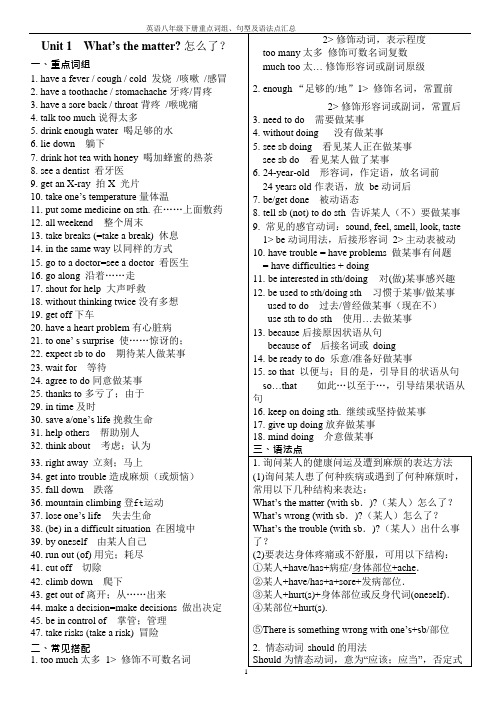
13.be back 回来14.be angry with sb 生某人的气15.throw down 扔下16.the minute=as soon as 一…就…e over 过来18.sit down 坐下19.take sb. for a walk 带某人去散步20.all the time 频繁;反复21.all day / evening 整日/夜22.shout back 大声回应23.walk away 走开24.in surprise 惊讶地25.share the housework 分担家务26.hang out 闲逛27.do chores 做杂务28.go to the store 去商店29.buy drinks and snacks 买饮料和点心30.make sb. do sth. 使某人做某事31.have enough stress from 有来自…足够的压力32.a waste of time 浪费时间33.in order to 为了34.get good grades 取得好成绩35.depend on 依赖;依靠36.have no idea 不知道37.develop children’s independence 发展孩子独立性38.look after=take care of 照顾;照看39.as a result 结果40.agree with sb 同意某人的观点/意见disagree with sb 不同意某人的观点/意见二、常见搭配1.finish doing sth. 完成做某事2.a few “几个”,后接可数名词复数few “很少,几乎没有”,后接可数名词复数a little “一点儿”,后接不可数名词little “很少,几乎没有”,后接不可数名词3.1> question “问题”,需要回答的问题,与ask或answer 搭配2> problem “问题”,需要解决的问题,与solve 搭配in the front of “在…前面”,在所说范围之内5.as…as… “与…一样…”,中间加形容词或副词原级,。
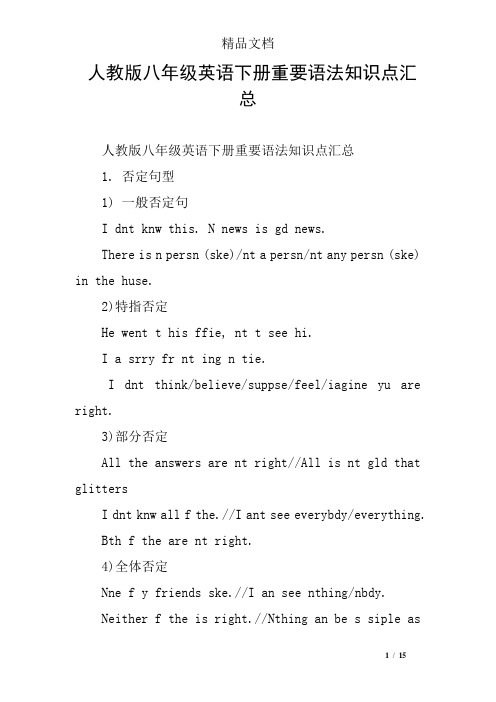
人教版八年级英语下册重要语法知识点汇总人教版八年级英语下册重要语法知识点汇总1. 否定句型1) 一般否定句I dnt knw this. N news is gd news.There is n persn (ske)/nt a persn/nt any persn (ske) in the huse.2)特指否定He went t his ffie, nt t see hi.I a srry fr nt ing n tie.I dnt think/believe/suppse/feel/iagine yu are right.3)部分否定All the answers are nt right//All is nt gld that glittersI dnt knw all f the.//I ant see everybdy/everything.Bth f the are nt right.4)全体否定Nne f y friends ske.//I an see nthing/nbdy.Neither f the is right.//Nthing an be s siple asthis.5) 延续否定yu didnt see hi, neither/nr did I.yu dnt knw, I dnt knw either.He desnt knw English, let alne/t say nthing f/nt t speak f (更不用说) Frenh.6) 半否定句e seld/hardly/sarely/barely hear suh fine singing.I knw little English. I saw few peple.7) 双重否定yu ant ake sething ut f nthing.//hats dne annt be undne.There is n sweet withut sweat.//N gain withut pains.I ant help /keep/ laughing whenever I hear it.N an is s ld but (that) he an learn.8)排除否定Everyne is ready exept yu.//He did nthing but play.But fr yur help, I uldnt d it.9)加强否定I wnt d it at all.//I ant see it any re.//He is n lnger a by.2. 判断句型1) 一般判断句It is iprtant fr us t learn English.It is kind f yu t help e sinere eans hnest.The by is alled/naed T.e regarded/nsider it as an hnr.2)强调判断It is English that we shuld learn.//It is he wh helped e a lt.3)弱式判断yur sentene desnt sund/lk/appear/feel right.yu lk/see as if/as thught yu had been there befre.aybe/Perhaps/ she is ill.He is prbably ill.//He is likely ill. //It is pssible that he is late4) 注释判断He an reeber s any English wrds, that is (t say) he is a living ditinary.(活字典)5) 正反判断That sunds all right, but in fat it is nt.6) 比较判断It is re a piture than a pe.7) 互斥判断He r yu are wrng. Either he is right r I a.3. 祝愿祁使句式1) 一般句式Study hard and keep fit. Be brave! Dnt be shy! Get ut f here.2)强语式D tell e. Never tell a lie.3) 委婉祈使句Please tell e the true. uld/ill/nt d e a favr?uld/D yu ind y sking? hat/Hw/ abut ging n ft?4)建议祈使句Let us g. Let us knw the tie. Dnt let the fire ut.Lets nt waste the tie. yud better start early.Shall we listen t se usi? hy dnt yu get sething t drink?Suppse/suppsing yu pik e up at abut six?I suggest we (shuld) take the train.5)祝愿句Suess t yu! //ish yu a gd urney.ay yu have a happy arriage. //Heres t yur suess!Allw e t prpse a tast t ur friendship!4. 感叹句型Hw well he speaks! //Hw kind she is! //hat a nie weather it is!Here he es! //Suh is life! //nderful! // Help!5. 疑问句型1) 一般疑问句Is he a dtr?//D yu the way t the statin?2)反意疑问句He is a teaher, isnt he?//It is quite heap, dnt yu think?3) 特殊疑问句hat is the distane/width/size/ppulatin/teperature/fare?h is he? hat is he?(干什么的)//hat is he like? // Hw is he?Hw d yu like hi? //hat d yu think f hi?hat ever d yu ean by saying this?4)选择疑问句He is a dtr r a nurse?5)间接疑问句D yu knw hw ld he is? //Tell e if (whether) yu like it.hat d yu think/say/suppse I shuld d?6. 数词句型1) 表数目It is exatly ten lk.//It is five iles away fr here.He is re than/ver/ at least nt less than 20.He is under/at st/n re than 20.2)表年月日He was brn n April 22 1994/in 1994 n the rning f t.1.3)表年龄He is 20 years ld/years f age.//He is at the agef 10.4)表倍数It is fur ties that f last years.This is fur ties as big (again) as that ne.This is fur ties bigger than that ne.The ine is duble what it was.The utput f al was 200% greater than in 1998.5)表计量It is 10 eters lng/wide/high.//It sts e 100 yuan.I spent 10 hurs t finish it.//It tk e 10 days t finish it.It is wrth 100 yuan.7. 关联指代句型1)两项关连I have tw bks, ne is hinese; the ther English.I have five bks, ne is hinese; the thers English.T say is ne thing, but/and/ t d is anther.ne the ne hand, I a yur teaher, and n the ther hand, I a als yu friend.Se like t play ftball, thers are fnd f basketball.2)先后顺序First/firstly, I wish gd health, send/sendly suess in yur study, third/thirdly gd luk in everything.First stp, then lk, finally rss.At first/in the beginning/ he wrd hard. Later/Afterwards he is nt s diligent.3)修饰限制This is the sae bk as I lst yesterday.This is the sae bk that I lst yesterday.(同一本书)Dnt trust suh a an as ver praise yu.He/ne/Thse/They wh shuld e failed t appear.A an/A persn/The ne/Anyne/Peple wh saw her liked her very uh.The day/tie/ent will e when hina is strngest in the wrld.4) 两项连接He an speak nt nly English but als Frenh.The bk is bth interesting and instrutive.It is neither ld nr ht.Please either e in r g ut.The ld wrker has experiene and knwledge as well.5)加和关系Besides literature, we have graar and writing.Apart fr xygen, there are se ther gases in the air.In additin t "if", there is any ther nuntins that an intrdue nditinal lauses.I ust g nw, inidentally, if yu want that bk.yu see t like tea, s d I.8. 比较句型1)等比句He is as tall as I. // He is the sae height as I.She is n less diligent than he. The lab is n better than a ttage.2) 差比句I speak English wrse than he des.//He is nt s/astall as I a.ur knwledge is uh inferir t their.3) 极比句He is the tallest f all in the lass.Nne/N ne/ is s blind as thse that wnt see.Nthing is s easy as this.4)比例句The re a an knws, the re he feels his ignrane(无知).5) 择比句He is taller than any ther by in the lassIt is better late than never.//They wuld die than live as slavesHe prefers ding t talking//He prefers t d rather than t talk.He prefers atheatis t English.//Id rather stay here.6)对比句yu think e idle, but n the ntrary, I a busy.They are wrking hard while yu are wasting yur tie.9. 比喻句型e ust wrk like hi.//He behaves as his father des.He speaks English as if/thugh he was a freigner.10. 条件假设句1) 一般事实If we sueed, what will the peple say?Suppse it rains, what shall we d?Persevere(坚持) and yull sueed.2)虚拟条件句If I were yu, I wuld g.//If yu had seen it, yu wuld have been ved.3)反条件句Unless yu try, yull never sueed.//Dnt ve, r/else/therwise Ill sht.4)唯一条件句If nly I have anther hane, I shall d better.nly in this way an we learn English well.S/As lng as we dnt lse heart, well sueed.5)推论条件句Sine that is s, there is n re t say.Nw that yu are grwn up, yu ust stp this behavir.11. 时间句型1)一般时hen I see hi, Ill tell hi.2) 表同时yull grw wiser as yu grw lder.rk while yu wrk, play while yu play.He wrked, at the sae/in the eantie he listened t the usi.3)限制时Every/eah tie when I went t his huse, he was ut.By the tie that we gt there, he was ut.4)交替时Seties he sings, seties he danes.At ne tie the baby ries, at anther it talks.5)先时I stpped he befre he began t talk with e.6)后时Ill tell yu after I finish it.7)紧接时As sn as I see hi, Ill tell hi.ne yu begin, yu ust ntinue.The (very) ent/instant (that) I saw hi, I regnized hi.n hearing the news, she bust int tears.Hardly had I seen the light, when I heard a lud thundering.8)延续时I havent seen hi sine I ae here.A friend is never knw till/until a an have need.12. 地点句型1) 一般地点here have yu been?here there is a will, there is a way.2)方位Hebei lies in the east f hina.apan is lies t the east f hina.The huse faes (t) the suth.He is sitting at the frnt f the lassrHe is standing in frnt f/befre e.He is sitting at the bak f/behind e.He is sitting in the bak f/at the rear f the lassr. He is sitting next t/besides e.He is sitting lse t/near e.At the tp f/n tp f the shelf, there are se bks. He is sitting n the left/right.The untain yu see t the right is the Purple untain.13. 原因句型He didnt g t shl beause he was ill.Sine we are all here, lets begin ur eeting.It ight rain yesterday, fr the grund was wet.Nw (that) we have finished the wrk, we an g he.I a glad t eet yu.I a srry that I hear that.Thank yu fr yur help.That is why he failed t e.He didnt e beause f/n aunt f the weather.He went ut f urisity.I sueeded thanks t his help.This failure is due t the fat they lak experiene.wing t ur int effrts, the task was fulfilled.hat are studying English fr?Fr what reasn did yu hse this?hats the pint f asking his t d that?Hw e yu never tld e abut it?hat with the wind and what with the rain, ur walk was spiled.14. 目的句型He stpped aside s that she uld g in.He sits in the frnt in rder that he an see wrds learly.He gets up early s as t/in rder t have tie t d exerises.He repeated it fr fear that there shuld be any istake.15. 结果句型It was very ld, s that the river frze.They st a lt f ney, s/therefre we use the arefully.He is suh a gd an that every ne likes hi.He ran s fast that n ne uld ath hi.He hurried t the huse nly t find that it was epty.I was aught in the rain. As a result, I had a bad ld.16. 程度句型Hw ften d yu write t yur parents?Hw lng d yu stay at he?It is s beautiful that we all lve it.It is t big fr yu.He is t exited t speak.He is nt ld enugh t knw this.The letter ust be sent as sn as pssibleyu ust wrk as hard as yu an.As far as I knw, I an speak nly English.17. 让步句型Thugh/Althugh he is rih, (yet/still) he desnt shw ff.yang as he is, he knw a lt f things.Even if/thugh he sueeded, he was nt prud.N atter what yu say, Ill still try t d it.keep al, whatever happens.In spite f this, we ust g ahead with ur plans.Regardless f all the diffiulties, well fight it ut t the end.18. 转折句型I searhed everywhere but uld nt find hi.yu ay g, nly return quikly.He is seriusly ill, still there is hpe f his revery.It lked like rain, hwever it was lear in the afternn.He is still yung, yet he is high up in the psitin.He didnt tell e the truth, I knw it, thugh.19. 省略句I think/say/suppse/expet/believe/hpe s.hy nt e earlier next tie?。
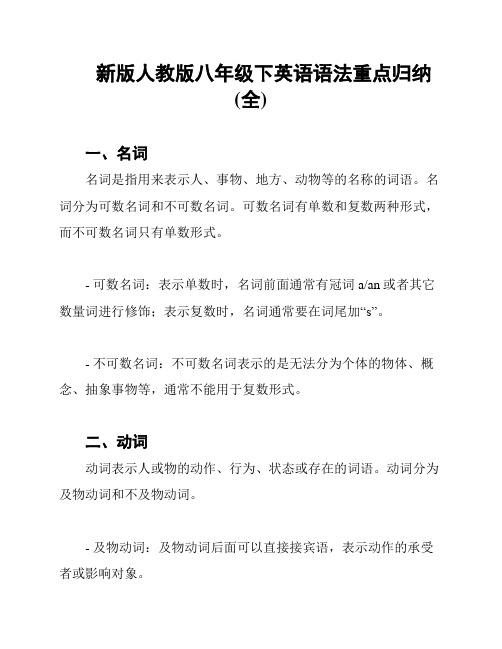
新版人教版八年级下英语语法重点归纳(全)一、名词名词是指用来表示人、事物、地方、动物等的名称的词语。
名词分为可数名词和不可数名词。
可数名词有单数和复数两种形式,而不可数名词只有单数形式。
- 可数名词:表示单数时,名词前面通常有冠词a/an或者其它数量词进行修饰;表示复数时,名词通常要在词尾加“s”。
- 不可数名词:不可数名词表示的是无法分为个体的物体、概念、抽象事物等,通常不能用于复数形式。
二、动词动词表示人或物的动作、行为、状态或存在的词语。
动词分为及物动词和不及物动词。
- 及物动词:及物动词后面可以直接接宾语,表示动作的承受者或影响对象。
- 不及物动词:不及物动词不能直接接宾语,它可以后面接副词或介词短语,表示动作发生的方式、状态等。
三、形容词形容词是用来描述名词性词语的词语。
它可以表示人或物的性质、状态、特征、颜色等。
- 形容词可以修饰名词,放在名词的前面。
- 形容词还可以通过加后缀“-er”和“-est”来比较级和最高级。
四、副词副词是用来修饰动词、形容词和其他副词的词语。
副词可以表示时间、地点、方式、程度、频率等。
- 副词在句中通常位于动词、形容词或者其他副词的前面。
- 副词的比较级和最高级可以通过在前面加上more和most来表示。
五、代词代词是用来代替名词或名词性的词语的词语。
代词可以分为人称代词、指示代词、疑问代词、不定代词等。
- 人称代词表示人的身份或人称,包括主格和宾格两种形式。
- 指示代词用来指示特定的人或物,可以表示近处的、远处的或已提到的事物。
- 疑问代词用于提问,通常用来询问人或事物的身份、性质、数量等信息。
- 不定代词用来指代不特定或泛指的人或物,表示数量或程度。
六、冠词冠词是位于名词前面用来修饰名词的词语。
冠词分为定冠词和不定冠词。
- 定冠词指特指某一具体的人或事物,有两种形式:定冠词“The”用于表示特定的人或物,而不定冠词“A/An”用于泛指任意的人或物。
七、介词介词是用来表示人或物之间关系的词语。

人教版英语八年级下册知识点总结一、语法知识点1. 时态:掌握一般现在时、一般过去时、一般将来时、现在进行时、过去进行时、过去将来时等时态的用法。
2. 过去进行时:用于表示过去某一时间正在进行的动作或状态。
3. 以下代词和副词的用法:- somebody, anybody, nobody, everybody 可用作主语或宾语。
- something, anything, nothing, everything 可用作主语或宾语。
- somewhere, anywhere, nowhere, everywhere 可用作地点副词。
4. 句型:掌握各种基本句型,如祈使句、选择疑问句、反义疑问句等。
5. 状语从句:掌握时间、原因、结果、条件等类型的状语从句的用法,并注意从句的引导词。
6. 定语从句:研究使用关系代词 who, whom, whose, which, that 引导定语从句,并了解先行词和关系词在从句中的作用关系。
二、词汇知识点1. 词汇拼写和用法:巩固和扩大基础词汇量,掌握词汇的正确拼写和用法。
2. 同义词和反义词:研究常用的同义词和反义词,提高词汇表达的能力。
3. 词组和固定搭配:掌握常用的词组和固定搭配,能够灵活运用。
三、阅读知识点1. 阅读理解:提高阅读理解能力,掌握快速获取信息的技巧。
2. 阅读策略:研究使用各种阅读策略,如扫读、略读、详读、推断等。
3. 阅读技巧:培养良好的阅读惯和技巧,如划重点、标记陌生单词等。
四、写作知识点1. 写作结构和组织:研究写作时合理安排文章结构和组织思路,使内容连贯。
2. 信息衔接和过渡:掌握信息衔接和过渡的方法,使文章各部分之间有逻辑性。
3. 词汇和句型运用:运用丰富的词汇和多样的句型,提高写作表达的准确性和流畅性。
以上为人教版英语八年级下册的主要知识点总结,希望能帮到你!。
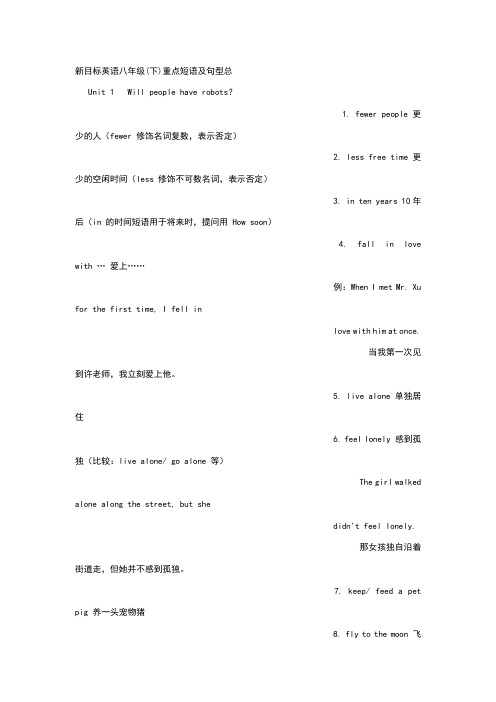
新目标英语八年级(下)重点短语及句型总Unit 1 Will people have robots?1. fewer people 更少的人(fewer 修饰名词复数,表示否定)2. less free time 更少的空闲时间(less 修饰不可数名词,表示否定)3. in ten years 10年后(in 的时间短语用于将来时,提问用 How soon)4. fall in love with … 爱上……例:When I met Mr. Xu for the first time, I fell inlove with him at once.当我第一次见到许老师,我立刻爱上他。
5. live alone 单独居住6. feel lonely 感到孤独(比较:live alone/ go alone 等)The girl walked alone along the street, but shedidn't feel lonely.那女孩独自沿着街道走,但她并不感到孤独。
7. keep/ feed a pet pig 养一头宠物猪8. fly to the moon 飞上月球9. hundreds of + 复数数百/几百(概数,类似还有 thousands of;millions of)10. the same as 和……相同11. A be different from B A与B不同(= There is a difference/ Thgere aredifferences between A and B)12. wake up 醒来(wake sb. up 表示“唤醒某人”)13. get bored 变得厌倦(get/ become 是连系动词,后跟形容词如 tired/angry/ excited 等)14. go skating 去滑冰(类似还有 go hiking/ fishing /skating/ bike riding 等)15. lots of/ a lot of 许多(修饰可数名词、不可数名词都可以)16. at the weekends 在周末17. study at home on computers 在家通过电脑学习18. agree with sb. 同意某人(的意见)19. I don't agree. = I disagree. 我不同意。

人教版八年级下册英语期末复习: 各单元重要语法知识点总结Unit 11.th.+ad.表示一类人, th.+姓氏复数形式, 表示夫妇两人或一家人, 谓语动词用复数2.hav.difficulty/troubl./problem.i.doin.st.“做某事有困难”,doing前的in可以省略。
3.动词不定式用法①动词不定式作宾语。
v+ to do sth 常见的动词有: want, decide, hope, plan,would like ,等, 表示还没有做的动作。
②动调不定式作状语。
表示行为、目的、结果。
句子+to do sth 或To do sth , + 句子③动词不定式作宾语补足语。
v+s..t.d.sth.常用动词有: as..wan..tell.wis.H.tol.me(mot).today、他叫我今天④表示感觉的动词, 如see,hear,notice,feel 等, 以及使役动词let, have,make等后常用省略to的动词作宾语补足语。
l see him leave.我看见他离开了。
⑤做主语。
做主语时常和It’s+ adj + for + sb + to do sth 转换, it's是形式主语, 动词不定式是真实主语⑥做定语。
a house to live in 住的房间paper to write on 写的纸。
此时的动词不定式与所修饰的名词构成动宾或逻辑关系。
4.happen的用法①sth.happene.t.s.某人出了某事(常指不好的事. eg:Wha.happene.t.you?你怎么啦?②sb.happen(s)to do sth.某人碰巧做某事eg: I happened to meet a friend of mine in the street yesterday.③辨析happen / take place happen是突然发生, 偶然发生的事, take place是按计划, 安排发生的事。
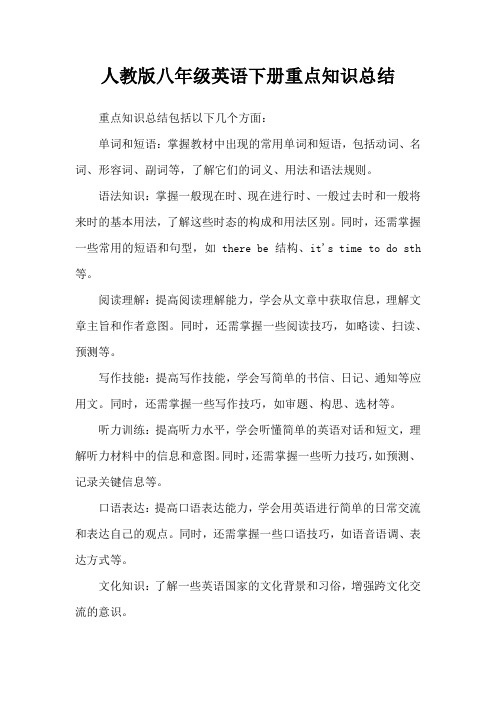
人教版八年级英语下册重点知识总结
重点知识总结包括以下几个方面:
单词和短语:掌握教材中出现的常用单词和短语,包括动词、名词、形容词、副词等,了解它们的词义、用法和语法规则。
语法知识:掌握一般现在时、现在进行时、一般过去时和一般将来时的基本用法,了解这些时态的构成和用法区别。
同时,还需掌握一些常用的短语和句型,如there be结构、it's time to do sth 等。
阅读理解:提高阅读理解能力,学会从文章中获取信息,理解文章主旨和作者意图。
同时,还需掌握一些阅读技巧,如略读、扫读、预测等。
写作技能:提高写作技能,学会写简单的书信、日记、通知等应用文。
同时,还需掌握一些写作技巧,如审题、构思、选材等。
听力训练:提高听力水平,学会听懂简单的英语对话和短文,理解听力材料中的信息和意图。
同时,还需掌握一些听力技巧,如预测、记录关键信息等。
口语表达:提高口语表达能力,学会用英语进行简单的日常交流和表达自己的观点。
同时,还需掌握一些口语技巧,如语音语调、表达方式等。
文化知识:了解一些英语国家的文化背景和习俗,增强跨文化交流的意识。
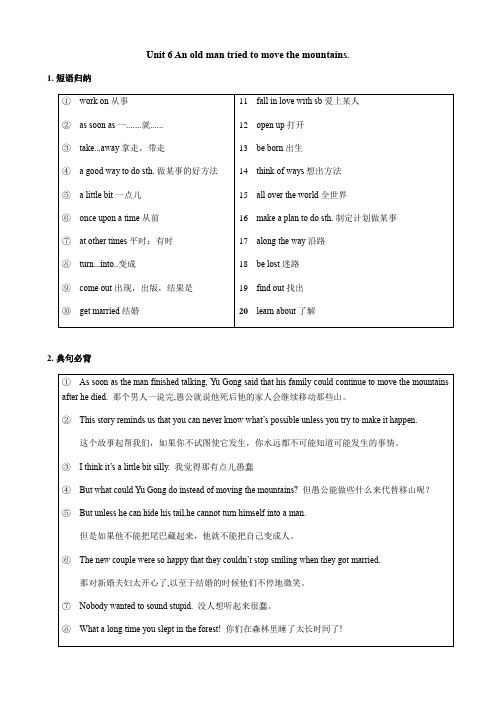
Unit 6 An old man tried to move the mountains.1.短语归纳2.典句必背3.用法集萃(1)As soon as the man finished talking, Yu Gong said that his family could continue to move themountains after he died. 那个男人一说完,愚公就说他死后他的家人会继续移动那些山。
❖as soon as表示“一...就...”,引导时间状语从句。
例:As soon as I went through customs, I jumped in a taxi. 我一过海关就跳上了一-辆计程车。
❖注意:在含as soon as、when等引导的时间状语从句的主从复合句中要遵循“主将从现”的原则,即主句如果用一般将来时,从句要用一般现在时。
(2)This story reminds us that you can never know what’s possible unless you try to make it happen.这个故事起帮我们,如果你不试图使它发生,你水远都不可能知道可能发生的事情。
❖remind作动词,意为“提醒;使想起”。
常见的搭配有:(3)I think it’s a little bit silly. 我觉得那有点儿愚蠢❖ a little bit是固定搭配,意为“有点儿;稍微”,用来修饰形容词或副词。
例:Your bedroom is a little bit dirty. Please clean it up.你的卧室有点儿脏。
请把它打扫干净。
Mike checked the papers a little bit carelessly, so he failed the exam again.迈克在检查试卷的时候有点儿粗心,所以他考试又没有及格。
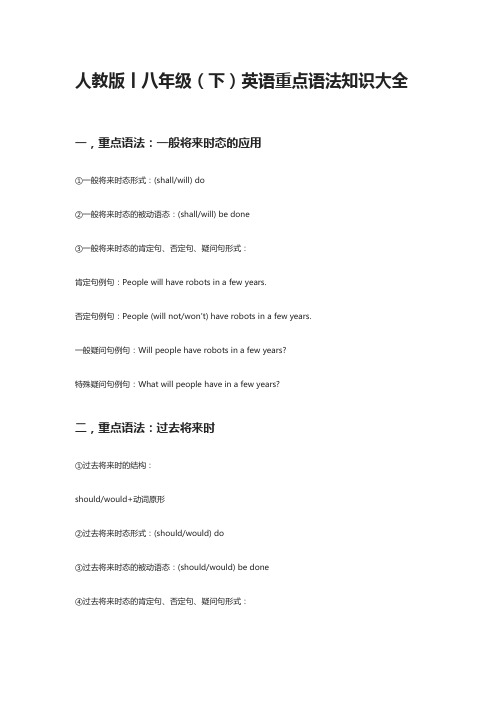
人教版丨八年级(下)英语重点语法知识大全一,重点语法:一般将来时态的应用①一般将来时态形式:(shall/will) do②一般将来时态的被动语态:(shall/will) be done③一般将来时态的肯定句、否定句、疑问句形式:肯定句例句:People will have robots in a few years.否定句例句:People (will not/won't) have robots in a few years.一般疑问句例句:Will people have robots in a few years?特殊疑问句例句:What will people have in a few years?二,重点语法:过去将来时①过去将来时的结构:should/would+动词原形②过去将来时态形式:(should/would) do③过去将来时态的被动语态:(should/would) be done④过去将来时态的肯定句、否定句、疑问句形式:肯定句例句:You should write a letter to him.否定句例句:You shouldn't write a letter to him.一般疑问句例句:Should I write a letter to him?特殊疑问句例句:What should I do?三,重点语法:过去进行时do/does 的过去进行时态形式:(was/were) doingdo/does 的过去进行时态的被动语态:(was/were) being done过去将来时态的肯定句、否定句和疑问句形式:肯定句例句:I was walking down the street when a UFO landed.否定句例句:I wasn't walking down the street when a UFO landed.一般疑问句例句:Were you walking down the street when a UFO landed? 特殊疑问句例句:What were you doing when a UFO landed?动词when 和while 的选择:when 后加瞬间动词,while 后加延续性动词。
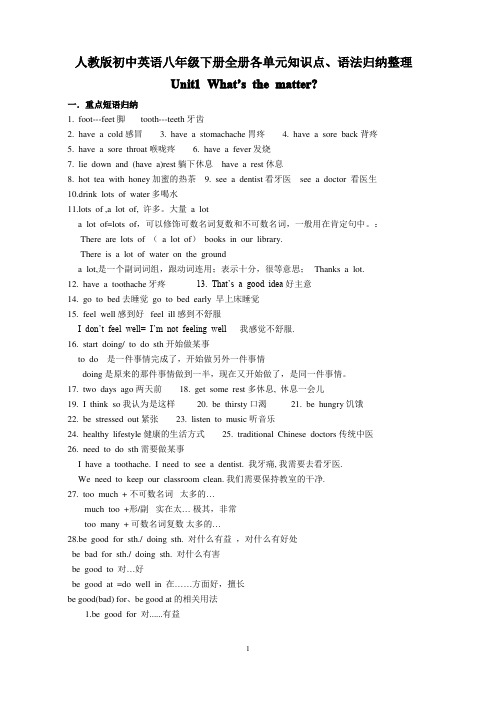
人教版初中英语八年级下册全册各单元知识点、语法归纳整理Unit1W hat’s the matter?一.重点短语归纳1.foot---feet脚tooth---teeth牙齿2.have a cold感冒3.have a stomachache胃疼4.have a sore back背疼5.have a sore throat喉咙疼6.have a fever发烧7.lie down and(have a)rest躺下休息have a rest休息8.hot tea with honey加蜜的热茶9.see a dentist看牙医see a doctor看医生10.drink lots of water多喝水11.lots of ,a lot of,许多。
大量a lota lot of=lots of,可以修饰可数名词复数和不可数名词,一般用在肯定句中。
:There are lots of(a lot of)books in our library.There is a lot of water on the grounda lot,是一个副词词组,跟动词连用;表示十分,很等意思;Thanks a lot.12.have a toothache牙疼13.That’s a good idea好主意14.go to bed去睡觉go to bed early早上床睡觉15.feel well感到好 feel ill感到不舒服I don’t feel well=I’m not feeling well我感觉不舒服.16.start doing/to do sth开始做某事to do是一件事情完成了,开始做另外一件事情doing是原来的那件事情做到一半,现在又开始做了,是同一件事情。
17.two days ago两天前18.get some rest多休息,休息一会儿19.I think so我认为是这样20.be thirsty口渴21.be hungry饥饿22.be stressed out紧张23.listen to music听音乐24.healthy lifestyle健康的生活方式25.traditional Chinese doctors传统中医26.need to do sth需要做某事I have a toothache.I need to see a dentist.我牙痛,我需要去看牙医.We need to keep our classroom clean.我们需要保持教室的干净.27.too much+不可数名词太多的…much too+形/副实在太…极其,非常too many+可数名词复数太多的…28.be good for sth./doing sth.对什么有益,对什么有好处be bad for sth./doing sth.对什么有害be good to对…好be good at=do well in在……方面好,擅长be good(bad) for、be good at的相关用法1.be good for对......有益Doing morning exercises is good for your health.做早操对你们的建康有益。

人教版八年级英语下册重要语法知识点汇总人教版八年级英语下册重要语法知识点汇总1. 否定句型1) 一般否定句I don't know this. No news is good news.There is no person (smoke)/not a person/not any person (smoke) in the house.2)特指否定He went to his office, not to see him.I am sorry for not coming on time.I don't think/believe/suppose/feel/imagine you are right.3)部分否定All the answers are not right//All is not gold that glitters I don't know all of them.//I can't see everybody/everything. Both of them are not right.4)全体否定None of my friends smoke.//I can see nothing/nobody. Neither of them is right.//Nothing can be so simple as this.5) 延续否定You didn't see him, neither/nor did I.You don't know, I don't know either.He doesn't know English, let alone/to say nothing of/not to speak of (更不用说) French.6) 半否定句We seldom/hardly/scarcely/barely hear such fine singing.I know little English. I saw few people.7) 双重否定You can't make something out of nothing.//What's done cannot be undone.There is no sweet without sweat.//No gain without pains.I can't help /keep/ laughing whenever I hear it.No man is so old but (that) he can learn.8)排除否定Everyone is ready except you.//He did nothing but play.But for your help, I couldn't do it.9)加强否定I won't do it at all.//I can't see it any more.//He is no longera boy.2. 判断句型1) 一般判断句It is important for us to learn English.It is kind of you to help me sincere means honest.The boy is called/named Tom.We regarded/consider it as an honor.2)强调判断It is English that we should learn.//It is he who helped me a lot.3)弱式判断Your sentence doesn't sound/look/appear/feel right.You look/seem as if/as thought you had been there before. Maybe/Perhaps/ she is ill.He is probably ill.//He is likely ill. //It is possible that he is late4) 注释判断He can remember so many English words, that is (to say) he isa living dictionary.(活字典)5) 正反判断That sounds all right, but in fact it is not.6) 比较判断It is more a picture than a poem.7) 互斥判断He or you are wrong. Either he is right or I am.3. 祝愿祁使句式1) 一般句式Study hard and keep fit. Be brave! Don't be shy! Get out of here.2)强语式Do tell me. Never tell a lie.3) 委婉祈使句Please tell me the true. Would/Will/Won't do me a favor? Would/Do you mind my smoking? What/How/ about going on foot?4)建议祈使句Let us go. Let us know the time. Don't let the fire out. Let's not waste the time. You'd better start early.Shall we listen to some music? Why don't you get something to drink?Suppose/supposing you pick me up at about six?I suggest we (should) take the train.5)祝愿句Success to you! //Wish you a good journey.May you have a happy marriage. //Here's to your success! Allow me to propose a toast to our friendship!4. 感叹句型How well he speaks! //How kind she is! //What a nice weather it is!Here he comes! //Such is life! //Wonderful! // Help!5. 疑问句型1) 一般疑问句Is he a doctor?//Do you the way to the station?2)反意疑问句He is a teacher, isn't he?//It is quite cheap, don't you think?3) 特殊疑问句What is the distance/width/size/population/temperature/fare? Who is he? What is he?(干什么的)//What is he like? // How ishe?How do you like him? //What do you think of him?What ever do you mean by saying this?4)选择疑问句He is a doctor or a nurse?5)间接疑问句Do you know how old he is? //Tell me if (whether) you like it. What do you think/say/suppose I should do?6. 数词句型1) 表数目It is exactly ten o'clock.//It is five miles away from here. He is more than/over/ at least not less than 20.He is under/at most/no more than 20.2)表年月日He was born on April 22 1994/in 1994 on the morning of Oct.1.3)表年龄He is 20 years old/years of age.//He is at the age of 10. 4)表倍数It is four times that of last years.This is four times as big (again) as that one.This is four times bigger than that one.The income is double what it was.The output of coal was 200% greater than in 1998.5)表计量It is 10 meters long/wide/high.//It costs me 100 yuan.I spent 10 hours to finish it.//It took me 10 days to finish it.It is worth 100 yuan.7. 关联指代句型1)两项关连I have two books, one is Chinese; the other English.I have five books, one is Chinese; the others English.To say is one thing, but/and/ to do is another.One the one hand, I am your teacher, and on the other hand, I am also you friend.Some like to play football, others are fond of basketball.2)先后顺序First/firstly, I wish good health, second/secondly success in your study, third/thirdly good luck in everything.First stop, then look, finally cross.At first/in the beginning/ he word hard. Later/Afterwards he is not so diligent.3)修饰限制This is the same book as I lost yesterday.This is the same book that I lost yesterday.(同一本书)Don't trust such a man as over praise you.He/One/Those/They who should come failed to appear.A man/A person/The one/Anyone/People who saw her liked her very much.The day/time/moment will come when China is strongest in the world.4) 两项连接He can speak not only English but also French.The book is both interesting and instructive.It is neither cold nor hot.Please either come in or go out.The old worker has experience and knowledge as well.5)加和关系Besides literature, we have grammar and writing.Apart from oxygen, there are some other gases in the air.In addition to "if", there is many other conjunctions that can introduce conditional clauses.I must go now, incidentally, if you want that book.You seem to like tea, so do I.8. 比较句型1)等比句He is as tall as I. // He is the same height as I.She is no less diligent than he. The lab is no better than a cottage.2) 差比句I speak English worse than he does.//He is not so/as tall as I am.Our knowledge is much inferior to their.3) 极比句He is the tallest of all in the class.None/No one/ is so blind as those that won't see.Nothing is so easy as this.4)比例句The more a man knows, the more he feels his ignorance(无知).5) 择比句He is taller than any other boy in the classIt is better late than never.//They would die than live as slavesHe prefers doing to talking//He prefers to do rather than to talk.He prefers mathematics to English.//I'd rather stay here. 6)对比句You think me idle, but on the contrary, I am busy.They are working hard while you are wasting your time.9. 比喻句型We must work like him.//He behaves as his father does.He speaks English as if/though he was a foreigner.10. 条件假设句1) 一般事实If we succeed, what will the people say?Suppose it rains, what shall we do?Persevere(坚持) and you'll succeed.2)虚拟条件句If I were you, I would go.//If you had seen it, you would have been moved.3)反条件句Unless you try, you'll never succeed.//Don't move,or/else/otherwise I'll shot.4)唯一条件句If only I have another chance, I shall do better.Only in this way can we learn English well.So/As long as we don't lose heart, we'll succeed.5)推论条件句Since that is so, there is no more to say.Now that you are grown up, you must stop this behavior. 11. 时间句型1)一般时When I see him, I'll tell him.2) 表同时You'll grow wiser as you grow older.Work while you work, play while you play.He worked, at the same/in the meantime he listened to the music.3)限制时Every/each time when I went to his house, he was out.By the time that we got there, he was out.4)交替时Sometimes he sings, sometimes he dances.At one time the baby cries, at another it talks.5)先时I stopped hem before he began to talk with me.6)后时I'll tell you after I finish it.7)紧接时As soon as I see him, I'll tell him.Once you begin, you must continue.The (very) moment/instant (that) I saw him, I recognized him. On hearing the news, she bust into tears.Hardly had I seen the light, when I heard a loud thundering.8)延续时I haven't seen him since I came here.A friend is never know till/until a man have need.12. 地点句型1) 一般地点Where have you been?Where there is a will, there is a way.2)方位Hebei lies in the east of China.Japan is lies to the east of China.The house faces (to) the south.He is sitting at the front of the classroomHe is standing in front of/before me.He is sitting at the back of/behind me.He is sitting in the back of/at the rear of the classroom. He is sitting next to/besides me.He is sitting close to/near me.At the top of/On top of the shelf, there are some books.He is sitting on the left/right.The mountain you see to the right is the Purple Mountain. 13. 原因句型He didn't go to school because he was ill.Since we are all here, let's begin our meeting.It might rain yesterday, for the ground was wet.Now (that) we have finished the work, we can go home.I am glad to meet you.I am sorry that I hear that.Thank you for your help.That is why he failed to come.He didn't come because of/on account of the weather.He went out of curiosity.I succeeded thanks to his help.This failure is due to the fact they lack experience. Owing to our joint efforts, the task was fulfilled.What are studying English for?For what reason did you choose this?What's the point of asking his to do that?How come you never told me about it?What with the wind and what with the rain, our walk was spoiled.14. 目的句型He stopped aside so that she could go in.He sits in the front in order that he can see words clearly. He gets up early so as to/in order to have time to do exercises. He repeated it for fear that there should be any mistake. 15. 结果句型It was very cold, so that the river froze.They cost a lot of money, so/therefore we use them carefully. He is such a good man that every one likes him.He ran so fast that no one could catch him.He hurried to the house only to find that it was empty.I was caught in the rain. As a result, I had a bad cold.16. 程度句型How often do you write to your parents?How long do you stay at home?It is so beautiful that we all love it.It is too big for you.He is too excited to speak.He is not old enough to know this.The letter must be sent as soon as possibleYou must work as hard as you can.As far as I know, I can speak only English.17. 让步句型Though/Although he is rich, (yet/still) he doesn't show off. Yang as he is, he know a lot of things.Even if/though he succeeded, he was not proud.No matter what you say, I'll still try to do it.Keep calm, whatever happens.In spite of this, we must go ahead with our plans. Regardless of all the difficulties, we'll fight it out to the end.18. 转折句型I searched everywhere but could not find him.You may go, only return quickly.He is seriously ill, still there is hope of his recovery.It looked like rain, however it was clear in the afternoon. He is still young, yet he is high up in the position.He didn't tell me the truth, I know it, though.19. 省略句I think/say/suppose/expect/believe/hope so.Why not come earlier next time?。